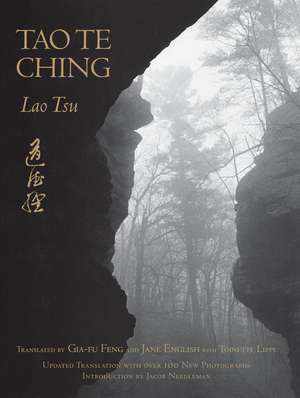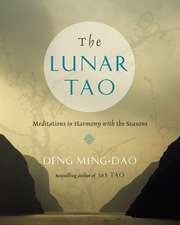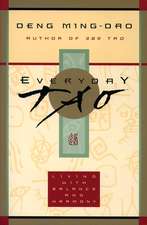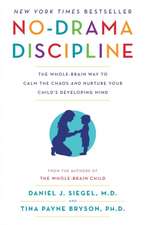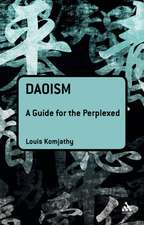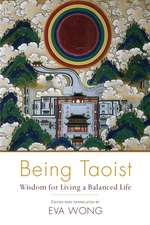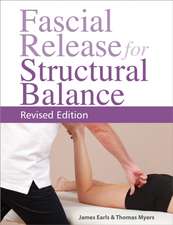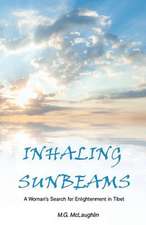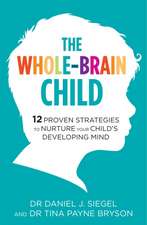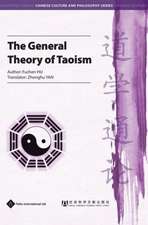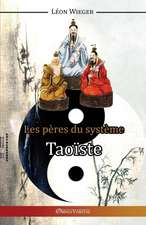Tao Te Ching: Seven Variations on a Love Story
Autor Lao Tsu, Gia-Fu Fengen Limba Engleză Paperback – 31 oct 2011
Lao Tsu’s philosophy is simple: Accept what is in front of you without wanting the situation to be other than it is. Study the natural order of things and work with it rather than against it, for to try to change what is only sets up resistance. Nature provides everything without requiring payment or thanks. It does so without discrimination. So let us present the same face to everyone and treat them all as equals, however they may behave. If we watch carefully, we will see that work proceeds more quickly and easily if we stop "trying," if we stop putting in so much extra effort, if we stop looking for results. In the clarity of a still and open mind, truth will be reflected. Te—which may be translated as "virtue" or "strength"—lies always in Tao meaning "the way" or "natural law." In other words: Simply be.
Preț: 115.11 lei
Preț vechi: 135.25 lei
-15% Nou
Puncte Express: 173
Preț estimativ în valută:
22.03€ • 22.100$ • 18.23£
22.03€ • 22.100$ • 18.23£
Carte disponibilă
Livrare economică 14-21 martie
Livrare express 27 februarie-05 martie pentru 55.70 lei
Preluare comenzi: 021 569.72.76
Specificații
ISBN-13: 9780307949301
ISBN-10: 0307949303
Pagini: 184
Ilustrații: black & white illustrations
Dimensiuni: 213 x 277 x 10 mm
Greutate: 0.62 kg
Editura: VINTAGE BOOKS
ISBN-10: 0307949303
Pagini: 184
Ilustrații: black & white illustrations
Dimensiuni: 213 x 277 x 10 mm
Greutate: 0.62 kg
Editura: VINTAGE BOOKS
Recenzii
"No one has done better in conveying Lao Tsu's simple and laconic style of writing, so as to produce an English version almost as suggestive of the many meanings intended. This is a most useful, as well as beautiful, volume—and what it has to say is exactly what the world, in its present state, needs to hear." —Alan Watts
Notă biografică
GIA-FU FENG was born in 1919 in Suzhou. He grew up in Shanghai and during World War II graduated from Peking University. He came to the United States in 1947 and earned a Master’s Degree at the Wharton School. Meeting Alan Watts in San Francisco and studying at the American Academy of Asian Studies, he found the path he had been seeking. He taught at Esalen Institute in Big Sur, California and founded Stillpoint Foundation, a Taoist community in Colorado where he lived until his death in 1985.
JANE ENGLISH, whose photographs form an integral part of this book, was born in Boston. She graduated from Mount Holyoke College and received her doctorate in experimental high energy particle physics from the University of Wisconsin. Her other books and calendars include Different Doorway: Adventures of a Caesarean Born, Fingers Pointing to the Moon, and the IceWisdom Calendar. She lives in Vermont. Her current work may be seen at www.eheart.com.
TOINETTE LIPPE worked at Alfred A. Knopf for more than thirty years. In 1989, she founded the Bell Tower imprint. Her own books include Nothing Left Over: A Plain and Simple Life and Caught in the Act: Reflections on Being, Knowing, and Doing. She now devotes herself to East Asian brush painting and her paintings and cards can be seen at www.toinettelippe.com.
JACOB NEEDLEMAN is professor emeritus of philosophy at San Francisco State University. Among his books are Lost Christianity, The American Soul, and What Is God?. In addition to his teaching and writing, he serves as a consultant in the fields of psychology, education, medical ethics, and philanthropy, and he was featured on Bill Moyers’ acclaimed PBS series, “A World of Ideas.” www.jacobneedleman.com.
JANE ENGLISH, whose photographs form an integral part of this book, was born in Boston. She graduated from Mount Holyoke College and received her doctorate in experimental high energy particle physics from the University of Wisconsin. Her other books and calendars include Different Doorway: Adventures of a Caesarean Born, Fingers Pointing to the Moon, and the IceWisdom Calendar. She lives in Vermont. Her current work may be seen at www.eheart.com.
TOINETTE LIPPE worked at Alfred A. Knopf for more than thirty years. In 1989, she founded the Bell Tower imprint. Her own books include Nothing Left Over: A Plain and Simple Life and Caught in the Act: Reflections on Being, Knowing, and Doing. She now devotes herself to East Asian brush painting and her paintings and cards can be seen at www.toinettelippe.com.
JACOB NEEDLEMAN is professor emeritus of philosophy at San Francisco State University. Among his books are Lost Christianity, The American Soul, and What Is God?. In addition to his teaching and writing, he serves as a consultant in the fields of psychology, education, medical ethics, and philanthropy, and he was featured on Bill Moyers’ acclaimed PBS series, “A World of Ideas.” www.jacobneedleman.com.
Extras
ONE
The Tao that can be told is not the eternal Tao. The name that can be named is not the eternal name. The nameless is the beginning of heaven and earth. The named is the mother of ten thousand things. Ever desireless, one can see the mystery. Ever desiring, one can see the manifestations. These two spring from the same source but differ in name; This appears as darkness. Darkness within darkness. The gate to all mystery.
TWO
Under heaven all can see beauty as beauty only because there is ugliness. All can know good as good only because there is evil. Therefore having and not having arise together; Difficult and easy complement each other; Long and short contrast each other; High and low rest upon each other; Voice and sound harmonize each other; Front and back follow each other. Therefore the wise go about doing nothing, teaching -no--talking. The ten thousand things rise and fall without cease, Creating, yet not possessing, Working, yet not taking credit. Work is done, then forgotten. Therefore it lasts forever.
THREE
Not exalting the gifted prevents quarreling. Not collecting treasures prevents stealing. Not seeing desirable things prevents confusion of the heart. The wise therefore rule by emptying hearts and stuffing bellies, By weakening ambitions and strengthening bones. If people lack knowledge and desire, Then it is best not to interfere. If nothing is done, then all will be well.
FOUR
The Tao is an empty vessel; it is used, but never filled. Oh, unfathomable source of ten thousand things! Blunt the sharpness, Untangle the knot, Soften the glare, Merge with dust. Oh, hidden deep but ever present! I do not know from whence it comes. It is the forefather of the ancestors.
FIVE
Heaven and earth are impartial; They see the ten thousand things as they are. The wise are impartial; They see the people as they are. The space between heaven and earth is like a bellows. The shape changes but not the form; The more it moves, the more it yields. More words count less. Hold fast to the center.
The Tao that can be told is not the eternal Tao. The name that can be named is not the eternal name. The nameless is the beginning of heaven and earth. The named is the mother of ten thousand things. Ever desireless, one can see the mystery. Ever desiring, one can see the manifestations. These two spring from the same source but differ in name; This appears as darkness. Darkness within darkness. The gate to all mystery.
TWO
Under heaven all can see beauty as beauty only because there is ugliness. All can know good as good only because there is evil. Therefore having and not having arise together; Difficult and easy complement each other; Long and short contrast each other; High and low rest upon each other; Voice and sound harmonize each other; Front and back follow each other. Therefore the wise go about doing nothing, teaching -no--talking. The ten thousand things rise and fall without cease, Creating, yet not possessing, Working, yet not taking credit. Work is done, then forgotten. Therefore it lasts forever.
THREE
Not exalting the gifted prevents quarreling. Not collecting treasures prevents stealing. Not seeing desirable things prevents confusion of the heart. The wise therefore rule by emptying hearts and stuffing bellies, By weakening ambitions and strengthening bones. If people lack knowledge and desire, Then it is best not to interfere. If nothing is done, then all will be well.
FOUR
The Tao is an empty vessel; it is used, but never filled. Oh, unfathomable source of ten thousand things! Blunt the sharpness, Untangle the knot, Soften the glare, Merge with dust. Oh, hidden deep but ever present! I do not know from whence it comes. It is the forefather of the ancestors.
FIVE
Heaven and earth are impartial; They see the ten thousand things as they are. The wise are impartial; They see the people as they are. The space between heaven and earth is like a bellows. The shape changes but not the form; The more it moves, the more it yields. More words count less. Hold fast to the center.
Textul de pe ultima copertă
The Tao Te Ching, the esoteric but infinitely practical book written most probably in the sixth century B.C. by Lao Tsu, has been translated more frequently than any work except the Bible. This translation of the Chinese classic, which was first published twenty-five years ago, has sold more copies than any of the others. It offers the essence of each word and makes Lao Tsu's teaching immediate and alive. The philosophy of Lao Tsu is simple: Accept what is in front of you without wanting the situation to be other than it is. Study the natural order of things and work with it rather than against it, for to try to change what is only sets up resistance. Nature provides everything without requiring payment or thanks, and also provides for all without discrimination - therefore let us present the same face to everyone and treat all men as equals, however they may behave. If we watch carefully, we will see that work proceeds more quickly and easily if we stop "trying", if we stop putting in so much extra effort, if we stop looking for results. In the clarity of a still and open mind, truth will be reflected. We will come to appreciate the original meaning of the word "understand", which means "to stand under". We serve whatever or whoever stands before us, without any thought for ourselves. Te - which may be translated as "virtue, or "strength" - lies always in Tao, or "natural law". In other words: Simply be.
